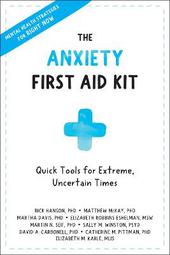
|
Anxiety First Aid Kit: Quick Tools for Extreme, Uncertain Times
Paperback / softback
Main Details
Description
A quick-relief guide for calming anxiety and stress right now-during the COVID-19 pandemic If you're feeling unprecedented levels of stress and anxiety right now, please know that you aren't alone. In these extreme and uncertain times, it's natural to be in a constant state of mental and physical strain. Whether you're dealing with job loss, a sick loved one, or just feeling the weight of the world during your 2 a.m. doomscroll-you need quick tools you can use right now, whenever and wherever you are, to lower stress and soothe anxiety. This emergency kit has you covered. Written by a dream team of mental health experts and grounded in evidence-based therapy, The Anxiety First Aid Kit offers powerful tools for triaging stress and anxiety in the moments when you need it most. You'll find easy and doable ways to help you press pause on panic, and find your calm spot right away. You'll discover in-the-moment interventions to help you relax before your anxiety and stress go into overdrive. And finally, you'll learn how to make healthy and workable lifestyle changes to improve your mental health and increase resilience, so you can effectively deal with stressful situations in the future-no matter what life throws at you. Between pandemic-related economic fears, the frustrations of social distancing, indoor confinement, work and household double duties (now including homeschooling!), and the looming threat of serious illness, is it any wonder you're feeling completely stressed out and anxious? If you need immediate relief, The Anxiety First Aid Kit has everything you need to manage stress and anxiety-right now.
Author Biography
Matthew McKay, PhD, is a professor at the Wright Institute in Berkeley, CA. He has authored and coauthored numerous books, including The Relaxation and Stress Reduction Workbook, Self-Esteem, Thoughts and Feelings, When Anger Hurts, and ACT on Life Not on Anger. He has also penned two novels, Us and The Wawona Hotel. McKay received his PhD in clinical psychology from the California School of Professional Psychology, and specializes in the cognitive behavioral treatment of anxiety and depression. He lives and works in the greater San Francisco Bay Area. Elizabeth Robbins Eshelman, MSW, is a licensed clinical social worker who worked as a staff operations consultant for the marketing and internet services group of the Kaiser Foundation Health Plan. She is now retired and lives in the San Francisco Bay Area. She is preparing to become a certified coach for executives and other individuals and plans to use skills and techniques from this book in her practice. Martin N. Seif, PhD, cofounded the Anxiety and Depression Association of America, and was a member of its Board of Directors from 1977 through 1991. Seif is associate director of the Anxiety and Phobia Treatment Center at White Plains Hospital, a faculty member of New York Presbyterian Hospital-Cornell Medical School, and is board-certified in cognitive behavioral psychology from the American Board of Professional Psychology. He maintains a private practice in Manhattan and Greenwich, and is coauthor of What Every Therapist Needs to Know about Anxiety Disorders. Sally M. Winston, PsyD, founded and directed the anxiety disorders treatment program at The Sheppard and Enoc Pratt Hospital in Towson, MD. She served as the first chair of the Clinical Advisory Board of the Anxiety and Depression Association of America (ADAA), and received their inaugural Jerilyn Ross Clinician Advocate Award. She is coauthor of What Every Therapist Needs to Know about Anxiety Disorders.
Reviews"One of the first books to address anxiety owing to the impact of COVID-19. Suggestions for relief offer techniques for calming down before concentrating on the more difficult work of managing anxious feelings. The authors, ranging from clinical psychologists to meditation teachers, tell readers how to feel better right now. The first chapter helps one "find calm right away" by offering awareness techniques and acknowledging that bad things sometimes happen. Following chapters provide readers with sample stressors, what to do about them immediately, and further steps to take going forward. The authors posit scenarios of possible stressful situations and offer healthy, positive responses to each. One chapter has readers explore their worst thoughts to a point of absurdity, which diminishes their power. Another offers steps for replacing worry with planning, thus mitigating anxiety. The final chapter provides techniques (the pendulum drop, the five-finger exercise) for quick relief. VERDICT: What's enticing about this book is its no-nonsense guide to feeling better. Ideal for these unsettling times; highly recommended for general readers." --Library Journal (starred review)-- "Library Journal" (9/1/2020 12:00:00 AM)
|